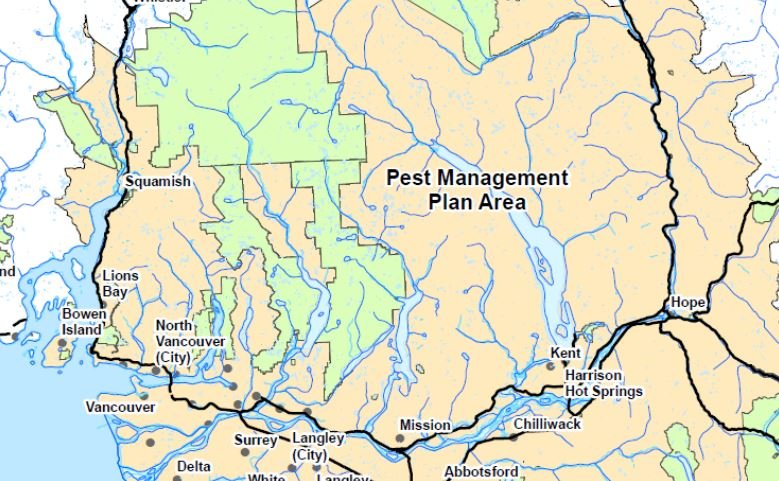
A proposal to spray herbicide in Squamish area has not yet been finalized. A spokesperson for the Ministry of Forests, Lands, and Natural Resource Operations told the Squamish Reporter the management plan issued by the Ministry ‘does not mean that application of herbicide will take place’.

“It would simply allow for the planning around the use of the herbicide to begin at that time, with care taken around the protection of multiple resource values as outlined in the permit,” the ministry said.
The five-year pest management plan involves spraying of herbicides such as glyphosate and triclopyr on crown land between Hope and Squamish. The plan comes into effect on April 1, but the ministry says notice for herbicide spray would be published in media and stakeholders will be consulted.

“If after monitoring growth performance it is felt that herbicides may be needed, a notice to apply would have to be consulted and published prior to the application of any herbicides,” the ministry said. The ministry added that any proposed use of herbicides must also be identified and approved by the Ministry of Environment and Climate Change Strategy.

“BC Timber Sales makes a concerted effort to avoid using herbicides, and have only utilized them in situations where other options have not been or may not be completely successful,” the Ministry said.
Angelina Hopkins Rose, a member of the St’át’imc Nation which also falls under the plan, has decried the spraying and is calling upon the government to reconsider the plan and increase the consultation time. She says the proposal will target salmonberry, huckleberry, thimbleberry, elderberry, salal, red raspberry, blueberry, mushrooms, Indian Hellebore, Devil’s club, and fireweed.
“These are all culturally significant plants and medicines that local Indigenous peoples have harvested and relied upon for thousands of years, and targeting them will have serious negative impacts on local Indigenous peoples, local wildlife, and wild salmon,” she says.
The plan is also being opposed by Stop the Spray, an advocacy group that calls the pest management program, ‘unethical and counter-productive.”
“This program literally mal-adapts our forests to climate change, makes fire and flooding worse, kills off the deciduous species that Indigenous culture and identity revolved around, yet we continue to spend taxpayer dollars to carry out these questionable objectives,” said James Steidle, the group’s spokesperson.
Angelina Hopkins Rose says the spraying not only harm medicinal plants, but their use has also been linked to cancer. Several US cities, including Seattle, have either banned or restricted glysophate though the US Environmental Protection Agency says glyphosate is unlikely to be a human carcinogen
Ministry of Forests, Lands, and Natural Resource Operations says the effect of glyphosate on human health has been extensively reviewed by international regulatory agencies, including Health Canada and the exposure to glyphosate does not pose a carcinogenic or genotoxic risk to humans.
Glyphosate remains an important tool for establishing conifer or conifer–deciduous mixed stands and ensuring future timber supply, the ministry added.




Tammy Kieselbach says
ENOUGH WITH THE POISONS!!! Mother Nature is best. Our entire world depends on it… not just the mighty dollar.
Go read The Hidden Word of Trees, by Peter Wholleben.
Dorothy says
This is insane! Why is there a need to spray this crap around? Have we not learned anything at all?